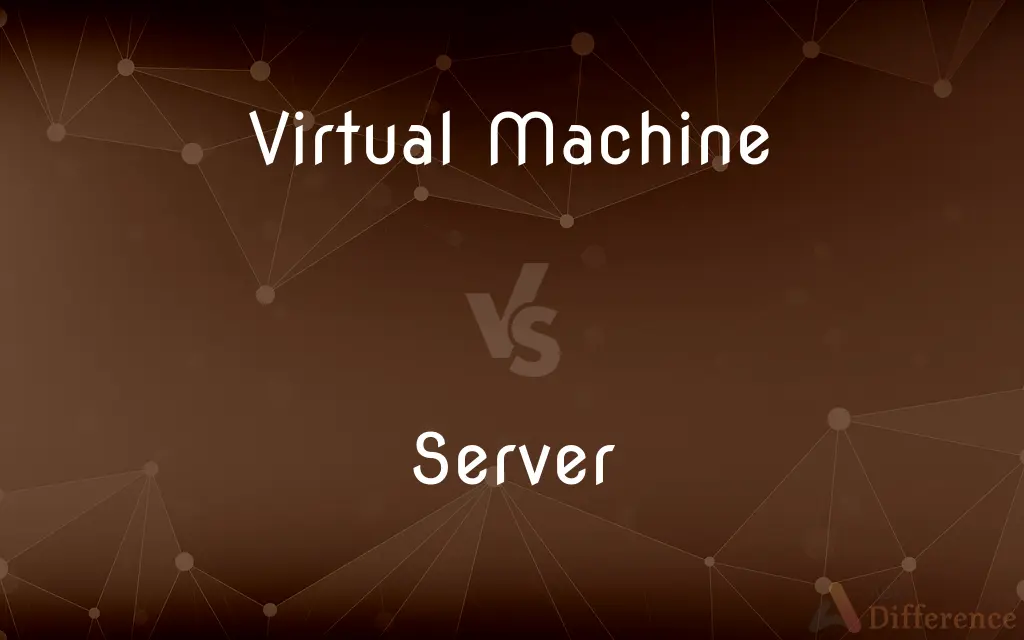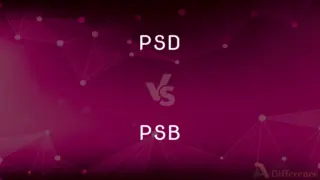Virtual Machine vs. Server — What's the Difference?
By Tayyaba Rehman — Published on December 29, 2023
A Virtual Machine (VM) is a software-based environment mimicking a physical computer, while a Server is a physical or virtual device designated to manage, store, and process data.

Difference Between Virtual Machine and Server
Table of Contents
ADVERTISEMENT
Key Differences
A Virtual Machine (VM) emulates a physical computer system, allowing multiple OS instances to run concurrently on a single physical machine. A Server, on the other hand, refers to a dedicated computer or software system designed to provide resources, services, or data to other computers, known as clients.
In terms of functionality, a Virtual Machine can act as a Server or even host multiple servers within its environment. The primary advantage of VMs is their ability to isolate different computing environments. A Server might be employed in various roles such as web, mail, or file serving, regardless of whether it's physical or virtual.
From a resource standpoint, Virtual Machines utilize the physical resources of the host machine but appear as separate entities with their own memory, CPU, and storage. A Server, particularly in a physical context, is equipped with its own tangible resources and might be tailored for its dedicated purpose with specific hardware components.
Flexibility and scalability are inherent advantages of Virtual Machines. They can be snapshotted, cloned, and moved across host systems with relative ease. Servers, especially when virtual, can be quickly provisioned, but physical servers may require more time and effort to set up and maintain.
Finally, when it comes to deployment, Virtual Machines allow businesses to maximize the use of their hardware by hosting multiple VMs on a single physical server. In contrast, a Server, especially when referring to a physical machine, is generally dedicated to a specific task or set of tasks and may not utilize all its resources efficiently if not fully loaded.
ADVERTISEMENT
Comparison Chart
Nature
Software-based emulation of a computer.
Can be a physical device or software.
Primary Function
Run multiple OS instances on a single machine.
Provide resources or services to clients.
Resource Dependency
Depends on host machine's resources.
Has its own resources or uses host's.
Flexibility & Scalability
Highly flexible and scalable.
Can be scalable, depends on setup.
Deployment Consideration
Maximize hardware usage by hosting multiple VMs.
Dedicated to specific tasks.
Compare with Definitions
Virtual Machine
An environment allowing multiple OS to coexist on a single host.
With a Virtual Machine, I can test software in different OS environments.
Server
A centralized repository or processor for applications or databases.
The company’s database Server stores millions of records.
Virtual Machine
A tool that enhances resource utilization and flexibility.
Using Virtual Machines, the company efficiently managed its IT resources.
Server
A software or hardware designed to respond to requests.
The game’s Server was overloaded due to many players online.
Virtual Machine
A software emulation of a physical computer.
I run Windows on my Mac using a Virtual Machine.
Server
The main component in a client-server architecture.
When the Server goes down, all the client machines are affected.
Virtual Machine
A method to partition physical hardware resources.
I allocated more memory to my Virtual Machine to improve its performance.
Server
A system managing network resources.
We use a Server to handle all our email communications.
Virtual Machine
An isolated and independent software instance.
Even if a virus infects one Virtual Machine, it doesn’t affect the others.
Server
One who serves food and drink. See Usage Note at waiter.
Server
Something, such as a tray, that is used in serving food and drink.
Server
An altar server.
Server
(Law) One who serves a legal process, such as a summons or court order.
Server
(Sports) The player who serves, as in court games.
Server
A file server.
Server
A computer that processes requests for HTML and other documents that are components of webpages.
Server
(computing) A program that provides services to other programs or devices, either in the same computer or over a computer network.
Server
(computing) A computer dedicated to running such programs.
Server
One who serves.
Server
A waitress or waiter.
Server
The player who serves the ball.
Server
(Christianity) A priest's attendant at the celebration of the Eucharist.
Server
A tray for dishes.
Server
A spoon for serving food.
Server
One who serves.
Server
A tray for dishes; a salver.
Server
A person whose occupation is to serve at table (as in a restaurant)
Server
(court games) the player who serves to start a point
Server
(computer science) a computer that provides client stations with access to files and printers as shared resources to a computer network
Server
Utensil used in serving food or drink
Server
A computer system providing data or services to client machines.
My website is hosted on a dedicated Server.
Common Curiosities
Can a Virtual Machine act as a Server?
Yes, a Virtual Machine can be configured to act as a Server and provide services to clients.
Why would one use a Virtual Machine?
Virtual Machines offer flexibility, isolation, efficient resource utilization, and testing capabilities across different OS environments.
What is a Virtual Machine?
A Virtual Machine is a software-based environment that mimics a physical computer, allowing for multiple OS instances to run on a single machine.
How is a Server different from a workstation?
A Server is designed to manage, store, and process data for clients, while a workstation is typically an end-user device.
Is a Server always a physical machine?
No, a Server can be a physical machine or a virtualized environment.
How do resources get allocated to a Virtual Machine?
Resources are allocated to a Virtual Machine from the host system based on configurations set by the administrator.
Why might a business choose a virtual Server over a physical one?
A business might choose a virtual Server for reasons like cost-efficiency, easy scalability, and flexibility in resource allocation.
How can I access a Server remotely?
A Server can be accessed remotely using various methods like SSH, RDP, or VPN, depending on its configuration.
What is the role of a hypervisor in relation to Virtual Machines?
A hypervisor is software that creates, manages, and runs Virtual Machines on a host system.
Can a single physical machine host multiple Virtual Machines?
Yes, a single physical machine can host multiple Virtual Machines using hypervisor software.
What happens when a Server fails?
When a Server fails, the services or data it provides become unavailable until it's restored or a backup is activated.
Is it safer to run software on a Virtual Machine?
Running software on a Virtual Machine can offer an added layer of isolation, which can be safer for testing untrusted applications.
Can Virtual Machines communicate with each other?
Yes, Virtual Machines can communicate with each other if they are configured to be on the same network or have network access.
How do I choose between setting up a Virtual Machine or a Server?
Consider your specific needs: for isolated testing environments or maximizing hardware, choose a VM; for dedicated tasks or services, opt for a Server.
Are Servers only used for websites?
No, Servers can be used for various purposes, including web hosting, email, databases, and more.
Share Your Discovery

Previous Comparison
Spanish Food vs. Mexican Food
Next Comparison
PSD vs. PSBAuthor Spotlight
Written by
Tayyaba RehmanTayyaba Rehman is a distinguished writer, currently serving as a primary contributor to askdifference.com. As a researcher in semantics and etymology, Tayyaba's passion for the complexity of languages and their distinctions has found a perfect home on the platform. Tayyaba delves into the intricacies of language, distinguishing between commonly confused words and phrases, thereby providing clarity for readers worldwide.














































